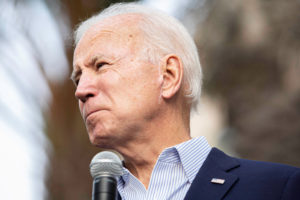With Biden’s student loan bailout on the rocks, it’s time to hold the university industrial complex accountable

In 1961, President Eisenhower warned of the threat posed by the military industrial complex—the private industry that’s cropped up around the U.S. armed forces. But since then, a new juggernaut has appeared that is holding young Americans financially hostage.
Fueled by misguided government policies, the “university industrial complex” is pushing a generation of college students into crippling debt. And, unfortunately, the Biden administration is at best ignoring the real problem while at worst exacerbating it.
How big is the problem? Currently, student loan debt amounts to a whopping $1.76 trillion — a figure that has more than doubled since 2010. Fueled by college tuition rates that are rising much quicker than earnings, the financial liabilities are ballooning at a rate that’s impossible for students to keep up with.
And with a tidal wave of fresh graduations happening this month, many young people are set to be whacked with a financial gut punch.
The question is why is college so expensive? Has the quality of education provided by these institutions skyrocketed as costs go through the roof? Far from it. Instead, colleges have shifted priorities.
Universities are building resort-style amenities that offer students everything from saunas to waterslides. Curriculums are being expanded to include degree specializations that have limited financial benefit in the real world. And billions are invested into armies of highly paid administrators that provide little additional value. How did schools survive before having a vice provost for equity and inclusion that earns north of $400,000 a year on staff?
These bloated costs have very real consequences — especially for students of color.
According to an analysis from the Education Data Initiative, Black college graduates, on average, are saddled with $25,000 more in student loans than their white counterparts. Moreover, Black borrowers are the most likely to struggle financially when faced with monthly bills to pay off the debt.
But rather than confronting the problem head on, the Biden administration is seeking to sweep it under the rug by forgiving $400 billion in student loans via executive action.
The plan is nothing more than a temporary band-aid that will give colleges a blank check to raise tuition even more. It signals to both university leaders and future students that more easy money is in the pipeline. And once the valve is open, young people can borrow thinking they won’t have to pay it back — a dynamic that academia will take advantage of.
That’s why my organization, the Job Creators Network Foundation, took legal action against the Biden administration to block the student loan bailout. And after arguing our case in front the Supreme Court in February, we’re optimistic the justices will rule in our favor and declare this loan forgiveness program illegal.
But ripping up Biden’s blank check to universities is only one side of the equation. Now, conservatives need to offer solutions. And that starts with holding university leaders’ feet to the fire.
Through legislative hearings and investigations that are profiled in the court of public opinion, policymakers should put colleges on the defensive — pressuring them to justify unsustainable tuition rate increases. University leaders should also be held accountable for providing students with transparent, realistic expectations of what career or financial outcomes degree holders can expect following graduation.
Additionally, government subsidies should be reined in. Rather than offering easy money to any prospective student that walks in the door, government-backed loans and financial aid should be more targeted. While those from low-income families that have the academic credentials to thrive in college should be given the opportunity, universities should have some skin in the game too.
How? Colleges could underwrite at least a portion of student loans. That way, the institutions hold a financial stake in the career success of their alumni.
The Biden administration’s student loan bailout is seemingly on the rocks. But now, policymakers need to take the next step and hold colleges and universities accountable to help address the student debt crisis.
Elaine Parker is the president of the Job Creators Network Foundation.





